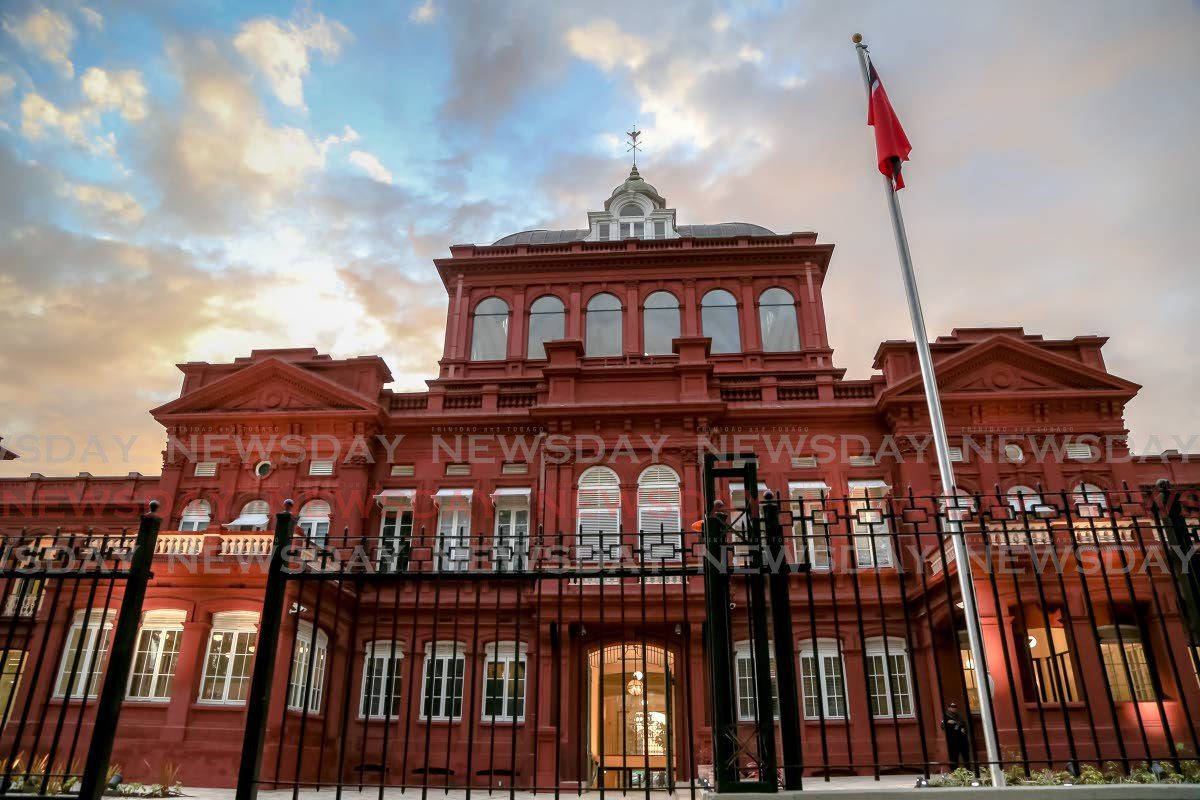By Ryan Hamilton-Davis
Copyright newsday

TT is standing at a pivotal moment in its history, facing several domestic, regional and international challenges which include a dynamic crime situation; challenges in accessing sufficient foreign exchange for the nation’s needs; global and regional tensions affecting TT’s economy; and the continued development of an energy sector which, though struggling, remains at the centre of TT’s revenue earnings.
Finance Minister Davendranath Tancoo’s maiden budget contribution, expected to be delivered in Parliament by the new fiscal year, is also expected to deliver the government’s plans in addressing these challenges as well as making good on the promises made by the UNC during the campaign trail.
The TT Chamber of Industry and Commerce and the Confederation of Regional Business Chambers both believe that this upcoming budget is an opportunity for the government to make bold fiscal and policy decisions that could stimulate the economy.
The American Chamber of Commerce (Amcham TT), in its 26-page budget recommendations, said the recent change in government has presented opportunities and challenges.
While the chambers made different suggestions in addressing some issues, they all called for diversification from the energy sector to ensure a stable TT.
An economic crossroads
The TT Chamber, in a 50-page document on its budget recommendations, took note that TT’s prosperity had long been linked to oil and gas.
The chamber noted that hydrocarbons account for about 32 per cent of TT’s GDP and 75 per cent of its export earnings.
The TT NGL Ltd’s website says that TT is one of the oldest hydrocarbon producers in the world, starting in the oil business in 1908. TT is also the seventh largest global producer of LNG.
TT has enjoyed significant revenues from the energy sector over the years, but after enjoying an energy boom in the early 2000s, it fell into a slump as oil and gas prices fell between 2014 and 2015.
A report from the World Bank said that between mid-2014 and early 2016, oil prices plummeted by 70 per cent – one of the biggest declines since the Second World War.
As a result, the country experienced multiple years of stagnation in the late 2010s.
Gains from the previous oil boom began to erode. The covid19 pandemic added to the strain on the economy, leading to a seven per cent economic contraction in 2020 along with an 11 per cent fiscal deficit.
The TT Chamber noted that the country has seen recent recovery, but it was driven by a rebound in the non-energy sector, particularly in manufacturing.
TT saw a growth in real GDP by 2.1 per cent in 2023.
However, the chamber said the slow climb back shows that TT’s output today remains near or below its level a decade ago.
This, the chamber said, signalled a lost decade of development.
“The country’s post-2014 trajectory from energy boom to bust to tepid recovery vividly illustrates why a new economic model is needed,” the chamber said in its budget recommendations.
“The current path is neither sustainable nor resilient to external shocks…The over-dependence on a single sector leaves the country highly exposed to commodity price swings.”
The chamber also noted that while TT’s GDP and export earnings come largely from energy, it only contributes to five per cent of national employment.
“In other words, the vast majority of jobs and non-energy businesses rely on a thin sliver of the economy that generates the bulk of export income.”
Diversification the key
The chamber said while the energy sector continues to supply revenue for the government, the non-energy sector – manufacturing, tourism and agriculture – plays a significant role in economic diversification, maintaining employment and ensuring that TT remains self-sufficient and resilient.
“These dynamics underscore the need for strategic budgetary interventions aimed at enhancing sustainability, boosting non-energy sector performance and maintaining macroeconomic stability,” the chamber said.
It urged a strategic pivot to new growth drivers in the upcoming budget with a focus on agriculture, services, marine services, professional services in the cultural and creative industries and in the “orange economy.”
“Each of these areas addresses a critical gap in the current economic structure and offers meaningful opportunities for revenue diversification and inclusive growth.”
Vivek Charran, president of the Confederation of Regional Business Chambers, said one of the challenges for businesses to break into the non-energy sector, particularly in manufacturing, is finances.
“The question is, how do we get SMEs and other people to move into light manufacturing, which requires machinery and requires land?
“Machinery is quite affordable but the problem is, land in TT is extremely expensive; and the price doesn’t really fluctuate, particularly for commercial property.
“If the government could find a way to provide more industrial parks in the short term – because this has to be done quickly – that would help.”
Charran said he expects the government to try to find ways to provide land on a deal basis, with the option to complete the purchase within a certain amount of years or to provide the land to companies and give a time limit to start up the manufacturing company or give it up.
Ultimately, he said the idea was to get as many small businesses to begin earning their own forex so it would not put a strain on the economy.
“The idea here is that you could have five big exporters which could bring in a huge amount of money, but if you have 100 new startups and everyone starts to make a couple thousand US dollars – $5,000 or whatever – that is going to add up.”
The TT Chamber noted that agriculture in TT has shrunk to a negligible share of the GDP – less than one per cent.
This, coupled with an over-reliance on imported food, leaves the country vulnerable.
The chamber suggested that a strong agricultural sector could be a new pillar of growth, which would reduce the food import burden, improve food security and develop niche export products.
It suggested that the government target agribusiness, modern farming techniques and agro processing for support, noting that these businesses can unlock latent potential in the economy.
“The TT Chamber recommends dedicated budget measures to develop ‘farm-to-market’ value chains, improve irrigation and support climate resilience adaptation in agriculture.
“By treating agriculture as a strategic sector with consistent policy support beyond electoral cycles, TT can simultaneously tackle its food security challenge and create a new stream of foreign exchange.”
The chamber added that expanding the service sector such as the orange economy – industries where creativity, culture and intellectual property are the primary outputs – offers promising pathways to diversifying exports.
“Services already account for over 60 per cent of the GDP and the majority of employment.
“However, the country’s service exports remain underdeveloped relative to its potential.”
President of the Supermarkets Association Biondi Bachew also said that moves to expand manufacturing, food processing and the tourism industry would be seen as a win for TT if it is properly supported.
“What the reduction in oil and gas revenue has done is create a catalyst for the private sector and the public sector to champion this goal.”
Amcham TT suggested nearshoring, mobilising private sector investments and providing tax incentives for decarbonisation as some of the means to drive TT forward through diversification.
On private sector investment, Amcham TT suggested that the government establish an investment fund or a special purpose investment vehicle to generate private capital for critical infrastructure and development projects.
“This mechanism would generate stable risk-mitigated returns for investors annually through government-backed partial risk guarantees,” Amcham TT said.
It also said the incentives would support national development priorities while maintaining fiscal prudence by mobilising private capital rather than adding to the public debt.
With regard to nearshoring, Amcham TT suggested that the government build on its existing nearshoring framework and focus on information technology-enabled services such as call centres and data centres, to reach job creation and skills development targets.
“Rather than reinvent the wheel, look to Jamaica as a benchmark from which to leverage learnings and best practices from their successful and growing business process outsourcing industry, which is a prioritised sector under their national export strategy.”
Rethink forex allocations
The TT Chamber said persistent forex shortages continue to affect business continuity, disrupt import supply chains and limit the ability of firms to grow, especially SMEs
“A lack of transparency in allocation and limited policy responsiveness has exacerbated business uncertainty,” the chamber said.
Speaking on the supermarket industry, Bachew said the increase in credit card spending, one of the factors highlighted by the Central Bank which contributes to TT’s forex crunch, was due to several factors including inconsistency in forex through regular banking channels.
“So there is a shift to charging these expenses on cards,” he said. “At present, there are no off-ramps available so reducing access to forex on credit cards leads to reducing what businesses are able to do, which means less upgrading of equipment and older software.”
He suggested that there should be SME forex windows at the banks where businesses, critical to the supply chain, can apply with proof of invoices, so that they can be given access.
However, Charran said while access to forex is a continuous challenge, the answer to TT’s problems may not be providing more forex.
“The only way the government can provide more forex is to look at the existing system, see where they can rearrange or better manage the current demand for forex and the forex reserves.”
He said a large part of who gets forex is still at the discretion of commercial banks.
“It’s a much more complex system than people think. The government can’t just go into the banks and say they need forex for certain areas. It can ask the banks to prioritise things, but the commercial banks would have their own lists.
“For example, if you have a huge loan with a bank and you have huge liabilities but your company needs forex to run the banks may give you priority over other people because it has a vested interest in your business. You may take priority over other people who may not have loans with the banks.”
The chamber provided a list of suggestions and recommendations for managing forex which included an adoption of a clear and transparent forex allocation policy which is accessible to all businesses, a publication of monthly reports on forex availability and distribution by the Central Bank, prioritisation of distribution to the productive and services sectors and improved access to SMEs and an expansion of the Eximbank window to cover a broader range of non-energy sectors.
It also called for improved co-ordination among authorised dealers and the business community.
The chamber suggested that the government reconsider a managed float system for forex.
“The TT Chamber considers (it) to be the most effective and transparent way for the foreign exchange rate to correctly reflect its true value,” it said.
It added that a managed float would reduce the black market buying and selling of foreign exchange thereby providing more funds to the banking system.
However, the Greater Tunapuna Chamber of Industry and Commerce president Ramon Gregorio warned that devaluation would see increases in prices across the board.
“Devaluing to TT$8-US$1 may not see substantial inflation, but then big conglomerates and supermarkets may increase prices to maintain their current margins.
“The cost of books and stationery from the UK and Europe will increase substantially.
“Most importers will have to consider the price of fuel – we import all our fuel.
“Devaluing TT$8-US$1 potentially raises the cost of fuel by 18 per cent, unless the government decides to subsidise the increase.”
Take a strong stance on crime
The chambers also called for the government to take a strong stance on crime.
Charran said streamlining of the FUL registration and the stand your ground legislation would help to tackle crime from a policy perspective.
“In other countries, we see that security services are able to track criminals.
“They are able to follow their movements through CCTV cameras.
“So what I really feel could also help in the investigation of crimes, whether it is kidnapping or robberies or shootings, is footage from security cameras that are tied to the command centre.”
“We have heard a lot about the security camera systems in TT, we would like to know how many of those cameras are actually working after they have done the audit. If we can get those cameras working and add additional cameras to cover these areas, the network of public surveillance increases.
“The FULs, stand your ground legislation and the camera systems would really help a lot with regard to investigations and responses to criminal activities.”
He also suggested the use of technology such as drones for surveillance.
The chamber said budgetary allocations alone would not be enough to meet the growing demand for equipment, technology and other support systems needed to strengthen public safety and law enforcement.
It suggested that the government introduce a targeted fiscal incentive for the private sector.
It suggested a 100 per cent tax deduction for individuals and companies that contribute financially to the police for operational or infrastructure-related support.
“The allowable deduction should be capped at TT$1,000,000 per donor, applicable for income years 2026 to 2028,” the chamber said.
“This measure would encourage corporate social responsibility, mobilise additional resources for the TTPS and promote stronger collaboration between the private sector and national security stakeholders.”
The chamber also called for sustained support for Crime Stoppers initiatives.
“Crime Stoppers TT provides a vital anonymous platform for reporting criminal activity and plays an important role in supporting national crime prevention efforts,” the chamber said.
“As a non-profit entity, it relies primarily on private donations and voluntary contributions to sustain its operations.
“Ensuring a consistent and sustainable funding stream is essential to maintaining the organisation’s effectiveness and ability to support law enforcement and public safety.”
The chamber suggested making donations to the organisation tax-deductible.
This also had a cap for up to a million dollars and proposed to be for income years 2026 to 2028.
“This measure would encourage ongoing private sector and citizen support for the organisation, helping to sustain its role in national crime prevention, while reinforcing public-private partnerships in community safety.”
Amcham TT suggested using technology to support the fight against crime, particularly in the police service.
It recommended that the TTPS launch a digitise crime management system as paper-based systems, handwritten reports and limited information sharing puts a drag on investigations.
“A digitised approach will increase oversight, accountability and efficiency,” the chamber said.
Amcham TT suggested that the government procure state-of-the-art software to manage the flow and oversight of investigations.
It also suggested equipping officers with appropriate hardware such as laptops and to establish secure cloud storage for case files and CCTV footage.
It also suggested that more investment is needed in community policing.
“Community engagement is a critical component of reducing crime.
“With young people being recruited into gangs at earlier ages, the TTPS must focus on building trust and confidence within communities.”



